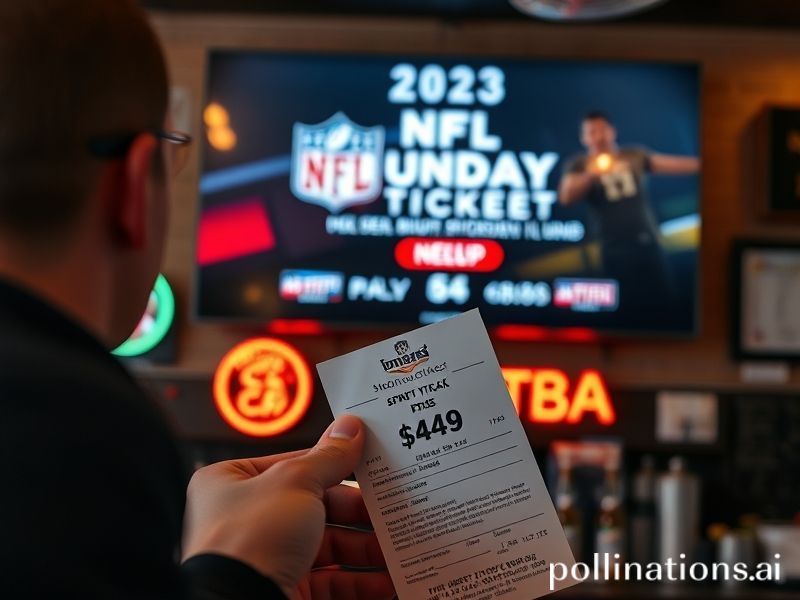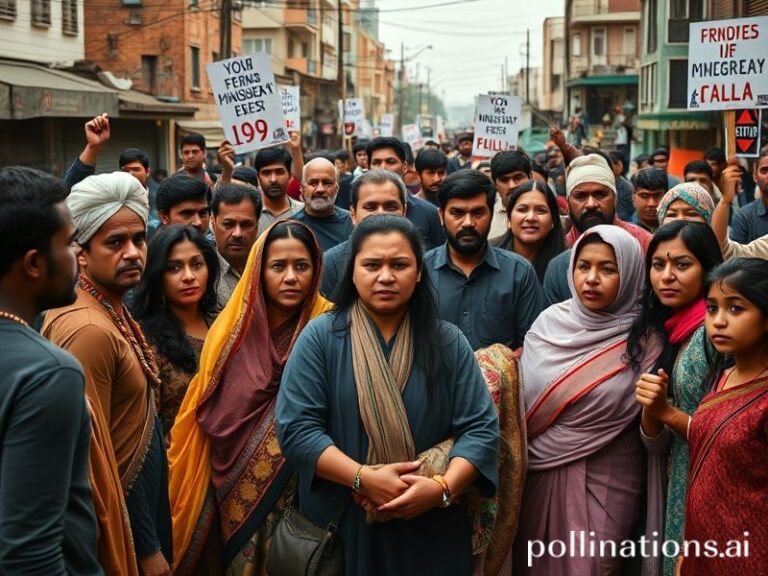Global Game Theory: How America’s $479 NFL Sunday Ticket Became the World’s Most Expensive Escape Room
**The Global Cost of American Football: How NFL Sunday Ticket Pricing Became a Barometer of Civilization’s Decline**
While the world grapples with climate refugees, food insecurity, and the occasional attempted coup, America’s most pressing crisis appears to be the escalating cost of watching grown men in spandex concuss each other for three hours every Sunday. The NFL Sunday Ticket—once a modest luxury for the obsessively patriotic—has metastasized into a $479-per-season subscription service that makes Netflix’s password-sharing crackdown look like a charity bake sale.
From our international vantage point, this spectacle offers a fascinating anthropological study in advanced capitalism’s death throes. European football fans, accustomed to watching their beloved clubs for roughly the cost of a decent sandwich, watch American consumers pony up nearly $500 annually with the same bewildered expression they reserve for Americans who measure distance in football fields or think “socialism” means having speed limits.
The pricing strategy, recently migrated from DirecTV’s satellite graveyard to Google’s streaming empire, represents something more sinister than mere corporate greed. It’s become a litmus test for how thoroughly late-stage capitalism has colonized leisure time itself. When Indian cricket fans can watch an entire IPL season for less than the cost of a Mumbai street meal, while Americans hemorrhage half a grand to watch 18 games, we witness the beautiful absurdity of market forces run amok.
Global implications? Consider the diplomatic ripple effects. As American expats from Lisbon to Laos huddle in VPN-enabled viewing parties, desperately masking their IP addresses like Cold War spies transmitting state secrets, they’re inadvertently creating a new form of soft power. Nothing says “American exceptionalism” quite like citizens risking cybersecurity to overpay for sports entertainment while their government argues about whether healthcare is a human right.
The international community has responded with characteristic subtlety. British pubs, those bastions of reasonable sporting economics, now advertise “Watch NFL Here—Because You’ve Clearly Lost Your Mind” specials. Australian sports bars offer therapy sessions with every overpriced American beer, recognizing that anyone paying $500 to watch the Jacksonville Jaguars probably needs professional help.
Meanwhile, developing nations view this pricing debacle with mixed emotions. On one hand, it confirms their suspicions that American priorities might be slightly misaligned. On the other, it presents an opportunity: several African nations have begun marketing safari packages promising “authentic wildlife experiences—cheaper than NFL Sunday Ticket, and the head trauma is optional.”
The broader significance extends beyond mere entertainment economics. As climate change renders outdoor activities increasingly unbearable and social media transforms human interaction into performative anxiety, we’ve created the perfect storm: a population willing to pay premium prices for the privilege of staying indoors, alone, shouting at televisions. The NFL Sunday Ticket isn’t just overpriced—it’s the admission fee to our collective hibernation from reality.
Perhaps most poignantly, this pricing structure serves as capitalism’s final joke on the working class. The same demographic that can’t afford surprise medical bills or retirement savings somehow finds $479 to watch millionaires play a game. It’s the bread and circuses of our modern decline, except the bread costs extra and the circuses require a subscription package.
As we stumble toward whatever passes for civilization’s twilight, future archaeologists will surely marvel at this phenomenon: a society that made basic survival prohibitively expensive while turning spectator sports into luxury goods. They’ll find our remains clutching remote controls, surrounded by empty beer cans and delivery food containers, our final expressions frozen in eternal frustration at referees who definitely blew that call in overtime.
The NFL Sunday Ticket price isn’t just about football—it’s about a world where we’ve monetized escape itself, then wondered why everyone seems so anxious. But hey, at least the commercials are entertaining.







